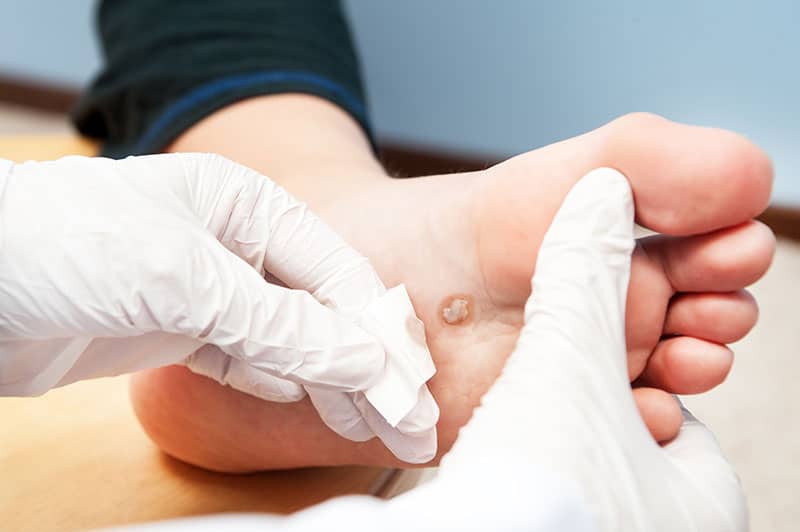Foot Warts cause and are they contagious

Foot warts are usually known as plantar warts/ Myrmecia/ verruca Plantaris or verruca caused by HPV( Human Papillomavirus) which occurs on the toes or on the sole of the foot. These HPV infections can be anywhere in the body but are not plantar. The virus is self-limiting but to decrease the duration and to reduce the symptoms and transmission, treatment is necessary. Genetics plays a major role in determining whether the disease is susceptible or not and about 7-10% of the US population are affected by plantar warts.
Cause:
Foot warts are epithelial tumors which cause infection by HPV types 1,2, 4, 60 or 63 but can also cause infection by other types like 57, 65, 66 and 156. These HPV types are classified as visible symptoms. Through direct contact virus enters the skin through abrasions and tiny cuts in the outermost layer of the skin. Plantar warts will not be visible to us for several weeks after getting infected. The wart may get pushed inward and a layer of skin will cover the wart due to the pressure of the sole or foot. Treatment is very much required and the patient will find it very uncomfortable and painful if not treated.
Diagnosis:
A plantar wart resembles a cauliflower and appears on the skin with tiny black hemorrhages in the center. Do not scratch or this can lead to pinpoint bleeding. Since plantar warts usually appear on the sole of toes pain will be experienced by the person suffering from this and will be difficult for him/her to stand or walk.
Prevention:
Human papillomavirus is spread by both direct and indirect contacts with an infected person. This can be avoided in many ways.
• Communally change rooms
• Change the benches and shower floors
• Do not share shoes or socks.
• Avoid contact with plantar warts on the remaining parts of the body.
This infection is very less common among grown-ups than children. These warts are contagious and various precautions must be taken to avoid the spreading of the virus. The British National Health services have put forward few steps which must be followed by the children affected with plantar warts.
• When using communal showers, it is necessary to wear flip flops.
• Do not share towels.
• While swimming, cover warts with an adhesive bandage.
Treatment:
These treatments listed below are found to be very effective against plantar warts.
Medication:
• Immunotherapy- A host immune response will be triggered by the virus when given an intralesional injection of antigens. This is a new way of treatment and is found to be effective and is recommended as second line therapy.
• Salicylic acid- Keratolysis treatment will peel away the dead skin cells with a chemical like trichloroacetic acid or salicylic acid.
• Cauterization- This method actually risks scars and will be effective only as a prolonged treatment. Cauterization of the base in the presence of anesthetic will be effective in a short term treatment.
• Laser- It is painful and expensive and is the last resort treatment but will be effective on warts which are hard to cure.








